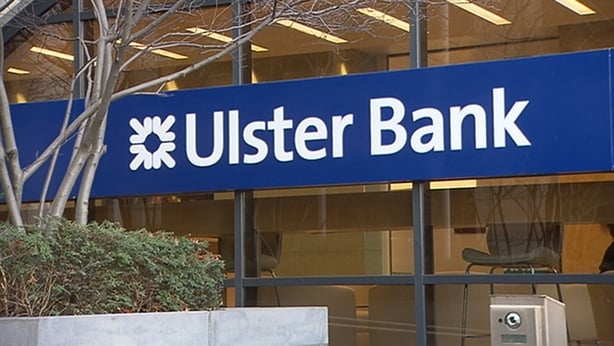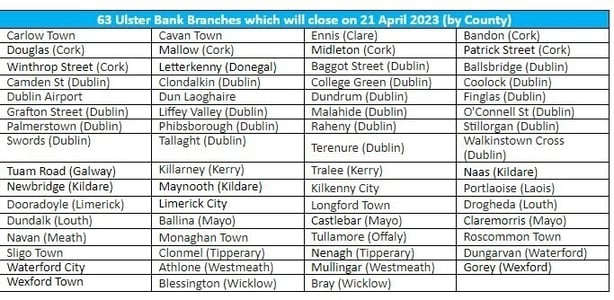Ulster Bank's remaining branches around the country have closed their doors to the public permanently.
The move is part of the lender’s gradual withdrawal from the Irish market.
In total, 63 branches shut for the final time at 4.30pm and ATM services will end three weeks after all in-branch transactions ceased.
The move will result in 450 staff leaving the bank and leave some areas with just one other full-service bank branch nearby.
We need your consent to load this rte-player contentWe use rte-player to manage extra content that can set cookies on your device and collect data about your activity. Please review their details and accept them to load the content.Manage Preferences
"Today is a poignant day in Ulster Bank’s 187-year history as our remaining 63 branches in the Republic of Ireland will close their doors for the last time," said the bank’s CEO Jane Howard.
"While the focus in recent months has been on supporting our customers as they move to new banking providers, we know our branches and colleagues have been a central part of communities around the country for many years," she said.
"I would like to extend our heartfelt gratitude to all of our branch colleagues over the years, particularly for their dedication over the past two challenging years, and I’d also like to thank our customers for allowing us to be part of your communities," she added.
The branch closures will not mean a complete end to the bank’s interactions with its remaining customers and it said a range of services and supports will continue through phone and online channels.
We need your consent to load this rte-player contentWe use rte-player to manage extra content that can set cookies on your device and collect data about your activity. Please review their details and accept them to load the content.Manage Preferences
Ulster Bank had around 1.1 million customers when it announced in 2021 that it planned to withdraw from the Republic of Ireland market.
Today it says that since January of that year, there has been a 99% reduction in branch transactions.
It also said that 99% of its personal current and deposit accounts are now either closed, inactive or with customers who have materially wound down their level of activity in their accounts to five or less transactions.
The bank said 91% of business account holders have either closed the account, reduced transactions to less than five or are inactive.
"As the closure of current and deposit accounts materially concludes, I strongly urge any remaining customer who has not yet moved their current and deposit account to act swiftly to find a new provider and move their accounts," Ms Howard said.

"Although our branches will no longer be open after today, we are still here to support our remaining customers."
The bank, along with the Banking and Payments Federation Ireland (BPFI) and Safeguarding Ireland said dedicated phonelines and supports for vulnerable customers moving bank account, as well as their carers, remain in place across all five retail banks.
A guide produced by BPFI for vulnerable customers and those caring for them is also still available, while advice is also available from the Competition and Consumer Protection Commission.
"Significant customer outreach and support for these customers has been underway for some time by the exiting banks and today we are strongly urging all customers, or their carers, who feel they require additional assistance to contact their bank as soon as possible," said BPFI Chief Executive, Brian Hayes.
Chairperson of Safeguarding Ireland, Patricia Rickard-Clarke, said while some customers can navigate the steps involved in moving account with extra support from their bank, others may need the help of a trusted family member, carer or a legal representative.
"If you are a customer or the carer of a customer who requires additional or tailored support, the most important thing is to just pick up the phone and talk to your bank," she said.
After today customers can contact Ulster Bank on 0818 210 260 or 00353 1804 7475 if calling from abroad, while those requiring additional support can access a dedicated phone line on 1800 656 001.
A small field team will also remain in place to help known vulnerable customers who have not yet completed their account closures.
Business customers will be able to call Ulster Bank on 1800 818 375.

Ulster Bank departure leaves 'gaping hole' in banking services here - FSU
John O'Connell, General Secretary of the Financial Services Union, has urged the Central Bank and the Department of Finance to ensure the provision of banking services at a local level is protected after Ulster Bank closed 63 branches for the last time today.
"This is a sad and difficult day for many staff and customers of Ulster Bank. Many staff have spent their entire working life employed by Ulster Bank in their retail branch network," Mr O'Connell said.
"I would like to take this opportunity to praise the staff for their professionalism and dedication to providing great customer service in what has been an incredibly challenging time," he added.
Mr O'Connell said the exit of Ulster Bank from the Irish market has left a gaping hole in banking services in communities across the country.
He said research carried out by the Department of Finance shows that people of all ages rely heavily on their local bank branch but that older people have a particular reliance on local banking services.
"This has been acknowledged by the Department of Finance in the Banking review and it is now incumbent on the department and the Central Bank to ensure that local banking services are protected and enhanced," he said.
A consultation is currently under way on the retention or otherwise of the banking levy. Currently any money raised by the levy goes directly into the general exchequer funding and is dispersed across all departments.
Mr O'Connell said the FSU believes it would be better to use the money raised by a banking levy for the common good, which would include enhancing and protecting local banking services for communities, businesses, and vulnerable people.







